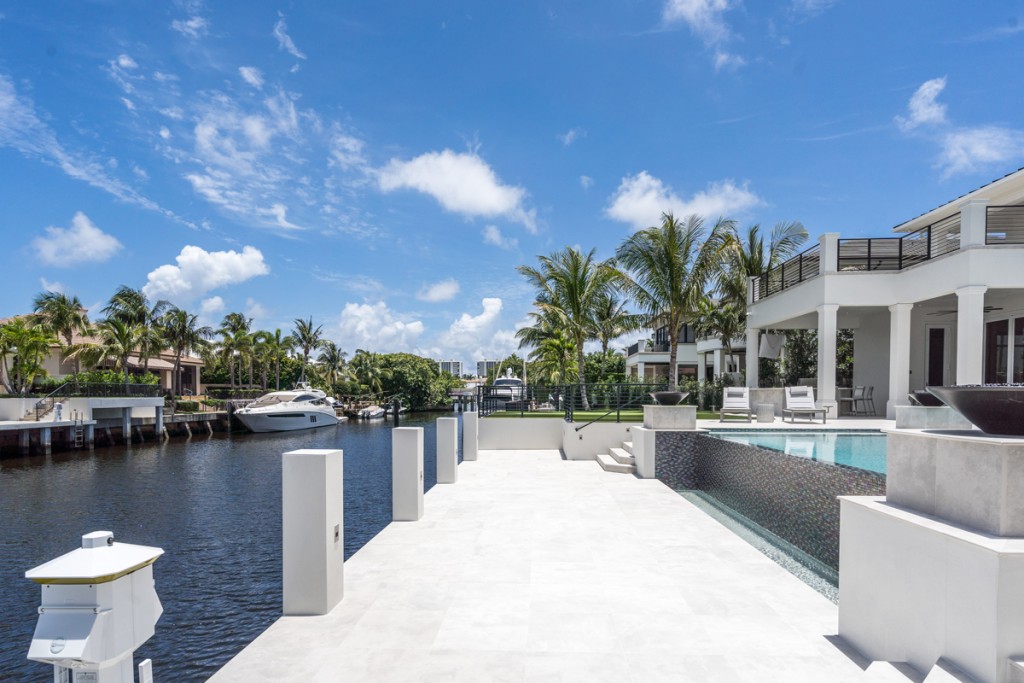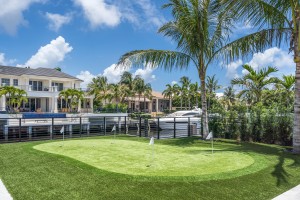Shopping for waterfront properties? Make sure you consider these key points.
When it comes to purchasing waterfront property, it’s tempting to jump right in. It’s not hard to see why, as the idea of living on the water sounds like paradise. However, there are some important considerations you need to make before sealing the deal.
If you’re thinking about purchasing one of the houses for sale in Royal Palm Yacht & Country Club’s community, take some time to consider these five important points.
Maintenance
Waterfront properties demand a higher level of maintenance than inland homes due to their direct exposure to moisture, salt air, wind, and sun. These natural elements can accelerate wear and tear on roofing, windows, paint, and decking—especially if the home is near saltwater. Regular inspections and proactive upkeep are essential to preserve structural integrity and aesthetic appeal.
When evaluating a potential home, ask your agent about any existing maintenance schedules, records, or warranties. Are there systems in place for managing humidity or salt corrosion? What materials were used on exterior finishes, and how often do they need attention? Maintenance needs can vary significantly depending on the property’s location, exposure, and build quality—so it’s critical to understand the unique upkeep requirements of the specific home you’re considering.
Insurance
Insurance for waterfront properties is often more complex and costly than for standard homes due to the elevated risks associated with flooding, hurricanes, and storm surge—especially in coastal regions like Florida. Buyers should budget for layered coverage that goes beyond basic homeowners insurance.
At a minimum, you’ll likely need three separate policies: a general hazard policy for fire and theft, a windstorm policy for hurricane-related damage, and a flood insurance policy—which is usually not included in standard coverage and must be purchased separately through the National Flood Insurance Program (NFIP) or private insurers. It’s also wise to understand how elevation, proximity to the waterline, and FEMA flood zone classifications will impact your premiums. Before making an offer, consult with a qualified insurance broker to get accurate estimates and confirm that the property can be fully insured under current regulations.
 Boat Access and Storage
Boat Access and Storage
For many buyers, direct water access is the primary reason to invest in a waterfront property—so it’s crucial to evaluate how well the home supports a boat-centric lifestyle. Ask whether the property includes a private dock, lift, or boathouse, and if so, confirm their condition, permitting status, and maintenance requirements. Some communities offer shared or deeded boat slips in a marina or designated common area, which may involve additional HOA fees or restrictions.
Also consider the type of boating you intend to do. Is the water deep enough for your vessel? Are there bridge height limitations or wake restrictions nearby? These details can affect both convenience and future resale value. Understanding the accessibility and practicality of boat storage will ensure the property aligns with your intended lifestyle from day one.
 Homeowners Association
Homeowners Association
Many waterfront properties fall under a homeowners association (HOA), which can significantly influence your ownership experience. While HOAs often maintain community amenities, enforce design standards, and manage shared infrastructure like seawalls or docks, they also impose monthly or annual dues and strict guidelines that govern how you use and modify your property.
Before buying, request and review the HOA’s Covenants, Conditions & Restrictions (CC&Rs), bylaws, and recent meeting minutes. Are there rules about short-term rentals, dock usage, or landscaping? Are there upcoming special assessments or planned improvements that could affect your costs? Speak directly with HOA management to understand enforcement practices, financial health, and community dynamics. Full clarity on HOA expectations helps avoid surprises and ensures the property fits your lifestyle and long-term plans.

Working With an Experienced Agent
Choosing an experienced real estate agent is absolutely essential when purchasing a waterfront property, where complexities go far beyond the average home transaction. A qualified local expert—especially in a dynamic market like Boca Raton—will understand everything from flood zone disclosures and dock regulations to HOA nuances and local permitting processes. They’ll know which areas are appreciating, which properties are prone to flooding, and how to navigate insurance and financing challenges specific to waterfront homes.
Just as important as knowledge is rapport. You’ll want an agent who listens to your needs, anticipates issues before they arise, and advocates for your best interest through negotiations, inspections, and closing. In high-stakes purchases like waterfront real estate, your agent isn’t just a facilitator—they’re your strategic advisor, project manager, and market insider rolled into one. Be sure to work with someone who brings deep local experience, proven success in waterfront transactions, and clear communication every step of the way.
Additional Insights
Beyond the essentials, here are a few critical factors that can greatly impact your long-term experience and investment in a waterfront property:
Shoreline and Water Conditions
The condition of the shoreline can affect both usability and property value—look for signs of erosion, seawall wear, or tidal shifts. Investigate whether the water is brackish, fresh, or saltwater, and consider factors like water depth, bottom composition (rocky, sandy, muddy), and suitability for activities like swimming, fishing, or mooring a boat. Also, ask whether dredging is required or regulated in the area.
Zoning and Environmental Regulations
Waterfront properties are often subject to stricter zoning codes, conservation easements, or setback requirements that limit how and where you can build. Before buying, check local regulations regarding dock construction, seawall repairs, vegetation removal, and home expansions. Some areas may also fall under state or federal environmental protection zones, which can influence your ability to modify the land or structure.
Privacy and Noise Levels
Not all waterfront properties offer the same level of seclusion—some may be near busy marinas, public access points, or high-traffic boating lanes. Consider the property’s exposure to foot traffic, boat noise, or neighboring short-term rentals. If peace and quiet are a priority, visit the home during different times of day and week to assess the true ambiance and activity levels.
Resale Value and Market Trends
Waterfront properties generally hold strong long-term value, but they’re also more sensitive to market shifts driven by environmental changes and buyer demand. Research past sale trends in the area and ask your agent for data on appreciation rates, average days on market, and buyer preferences for waterfront features. A well-positioned, well-maintained property in a high-demand zone often commands a premium—but only if it aligns with future market expectations.
Climate Risks and Flood Zones
Coastal properties in Florida are increasingly exposed to risks from hurricanes, rising sea levels, and storm surge, all of which impact insurance, financing, and long-term value. Check the property’s FEMA flood zone designation, elevation certificate, and historical flood data. It’s also smart to explore whether flood mitigation systems—such as stormwater drains, raised foundations, or seawalls—are in place or needed.
Utilities and Property Infrastructure
Many waterfront homes rely on private systems like septic tanks, wells, or lift stations, which require regular maintenance and inspections. Ask for details about the age and condition of these systems, any permits or code compliance issues, and whether public utilities are available. Also review the condition of bulkheads, docks, and drainage infrastructure to avoid costly surprises post-purchase.
Work With Us
If you’re interested in living near the waterfront and purchasing one of the Royal Palm properties in Boca Raton, don’t hesitate to contact us today! It would be our pleasure to help you with your home buying journey.



